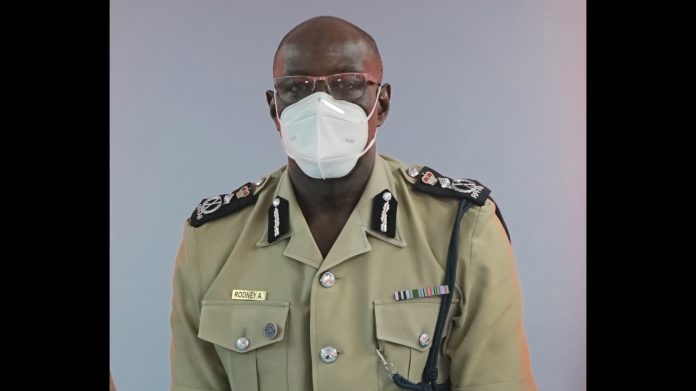by Kadeem Joseph
Commissioner of Police Atlee Rodney is being taken to task following the August 8 “illegal” protest in St John’s that “forced” law enforcement to teargas the crowd and fire rubber bullets in the hopes of breaking up the gathering.
The day following, Rodney was asked if he would have handled the situation differently. He not only responded “no,” but also commended officers for standing their ground and enforcing the laws of the land as some protestors responded to the gassing by hurtling projectiles back at law enforcement.
The incident and the Commissioner’s subsequent response raised the ire of many, including activists and opposition parties who pointed to members of the police force also suffering and having to seek refuge due to the fumes.
Ambassador-at-Large for the Global Organisation of Parliamentarians Against Corruption, an international alliance of elected parliamentarians aiming to combat corruption, strengthen good governance and uphold the rule of law, Akaash Maharaj said Rodney’s response was one that sought to “justify” rather than “reflect” on what had transpired.
“One of the most telling aspects of the use of rubber bullets and teargas is that not only did the police teargas the protestors, they inadvertently tear-gassed some of their own members and, if the commissioner of police can note a situation where one group of police officers accidentally used tear gas against their own colleagues and he could still say that he would do nothing differently, then I think he needs to consider what actually went on here,” he opined.
Maharaj said that even if one may believe that the use of teargas was appropriate, an assertion that he rejects, questions must be asked about the training of members surrounding the use of these “weapons” if the result is members of the force themselves being caught in the gas.
“Unless the police commissioner is going to argue that members of his own police force were acting in a criminal way and deserved to be gassed, then for that reason only he has to concede that errors were made in the police response,” he said.
Maharaj also examined why it was necessary for law enforcement to respond. He said, if accepting that the gathering was illegal, one must question what the officers were trying to achieve.
He said if they were trying to retaliate since the protestors defied the police, then “the use of force is unjustifiable”.
The diplomat charges that the only justifiable reason for the use of force during an illegal event such as this is to prevent greater harm coming to the public.
Maharaj said if there was harm from this “nonviolent but illegal assembly” it would be largely because it could be a spreader event during a pandemic, “but dispersing the crowd violently is going to make matters worse rather than better”.
He is suggesting a better response would have been cordoning off the demonstrators, waiting them out and then legally pursuing the ring leaders.
“You cannot attack a non-violent protest, even if it’s illegal. Especially, if your attacking them is going to cause more harm to the people of Antigua and Barbuda,” he concluded.
Meanwhile, retired Cayman Islands police officer Courtney Myles, who joined Maharaj on Sunday’s Big Issues programme, agreed that the police could have handled the situation differently.
His career with the service spanned 42 years in his home country, where he was most recently the head of the Community Policing Department.
Myles said, “They should have taken into consideration that it was an illegal protest, however, the fact still remains that it was not violent. They could have proceeded by other means in bringing the offending personnel to justice.”
The former police prosecutor said the police should have also examined the impact the teargas would have on the surrounding communities as well.
He said the police should review their training and procedures in light of members of their ranks and “innocent people” being affected.
Myles went a step further by suggesting that there may need to be a public inquiry into the matter to see why the police used their particular approach on August 8, since they will have to respond to other protests in the future.
Commissioner Atlee Rodney has been approached for comment.

